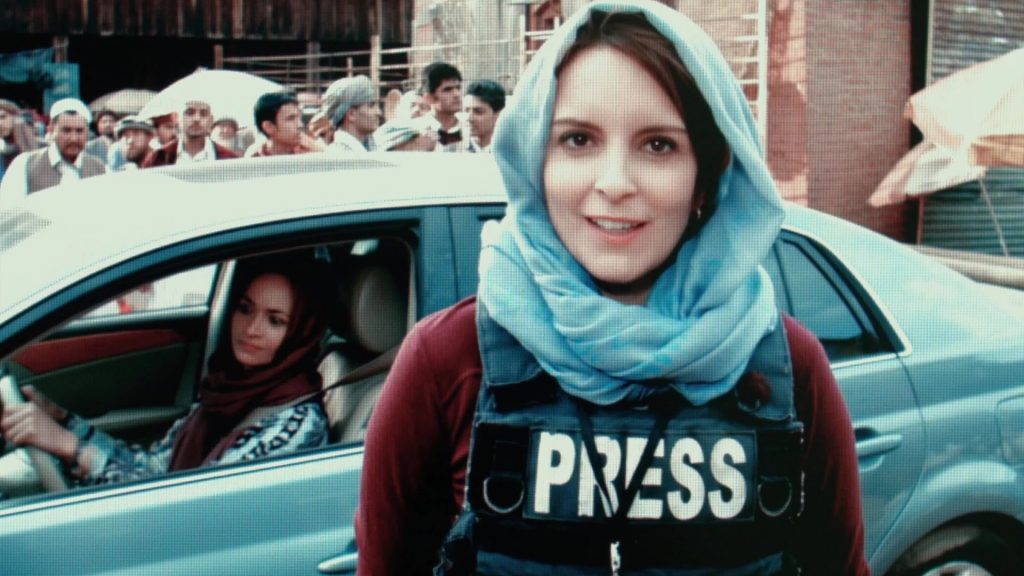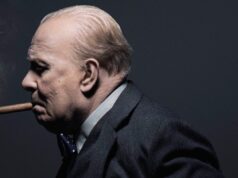As surprising as it may be for a film about the war in Afghanistan, Whiskey Tango Foxtrot finds a remarkable balance between comedy and seriousness
Whiskey Tango Foxtrot (2016)
Directed by Glenn Ficarra and John Requa. Written by Robert Carlock based on “The Taliban Shuffle: Strange Days in Afghanistan and Pakistan” by Kim Barker. Starring Tina Fey, Margot Robbie, Martin Freeman, Christopher Abbott, Alfred Molina, Billy Bob Thornton, Josh Charles, Sheila Vand, Nicholas Braun, Steve Peacocke, Evan Jonigkeit, Scott Takeda, Cherry Jones, Sterling K. Brown and Thomas Kretschmann.
In 2011, American international journalist Kim Barker published a memoir called The Taliban Shuffle: Strange Days in Afghanistan and Pakistan detailing her experiences as a war correspondent in those two countries during Operation Enduring Freedom. According to her, it was after Michiko Kukutani reviewed the book for the New York Times — even stating that Barker “depicts herself as a sort of Tina Fey character” — that Fey herself became interested and decided to turn the story into a film. In fact, Fey was clever to notice that Barker’s book was the perfect material for a comedy (or dramedy), no matter how strange this may sound for a story about the Taliban and the war in Afghanistan.
Adapted by Robert Carlock (a veteran of Fey’s TV series 30 Rock) and directed by Glenn Ficarra and John Requa (I Love You Phillip Morris, Crazy, Stupid, Love), Whiskey Tango Foxtrot (whose cheeky title is military phonetic alphabet for “WTF”) begins when Kim Barker (Tina Fey) is assigned to Afghanistan, leaving her disappointed boyfriend Chris (Josh Charles) back home. There, she meets other international journalists, among them noted Australian correspondent Tanya Vanderpoel (Margot Robbie) and lewd Scottish freelance photographer Iain MacKelpie (Martin Freeman). Helped by her Afghan “fixer” Fahim Ahmadzai (Christopher Abbott) to find stories, Barker begins to put herself in dangerous situations so that she can capture combat incidents on camera while, at the same time, starts to feel competitive towards her fellow journalists as she tries to get more and more stories.
Finding a remarkable balance between comedy and seriousness right from the beginning, Whiskey Tango Foxtrot depicts Afghanistan as a hostile place covered with windy, dusty landscapes that seem awfully uninviting — and Barker is even expected from the locals to cover herself and look like another “beautiful, mysterious IKEA bag.” To make things more complicated, she needs to adapt (and fast) to an environment made up mostly of men, which naturally includes the casual sexism that comes in it. My favorite moment that illustrates her fish-out-of-water predicament is when she needs to take a leak in the bushes during a field operation and a soldier tells her without mincing words “it must be a hell of a hairy dump.” It is the kind of humor that no one expects to blend so well with action scenes shot with a handheld camera in the middle of the desert dust.
And who can better pull that off than Tina Fey, who has proved many times that she can be really funny with a deadpan face? On the other hand, she definitely knows how to keep her character grounded in reality as well, even in the weirdest situations, like when fictional Afghan government official Ali Massoud Sadiq (Alfred Molina) makes awkward sexual advances when she tries to use him as a source. Molina is great, despite being a strange choice for an Afghan considering that he is half-Spanish half-Italian, in another irritating example of Hollywood whitewashing.
The rest of the cast also shines: Margot Robbie is beautiful and delightfully foul-mouthed, Josh Charles is always talented and Billy Bob Thornton is hilarious as General Hollanek of the US Marine Corps, who sees Barker as a nuisance in his way but then gets used to her. However, there are two actors who stand out. First, Martin Freeman plays a surprisingly complex character who seems like a chauvinist who has no respect for women but later reveals an unexpected side. Soon we realize that there is a lot more to this man than he shows and the kind of person he actually is.
But it is Christopher Abbott who blew me away and even made me forget the whole whitewashing for a minute. His Fahim develops the kind of nuanced relationship with Barker that turns out to be the most interesting element in the film, especially when he finally confronts her about her obsession with dangerous situations that resemble a drug addiction. This scene is so wonderful (and Abbott so impressive) that I wish to see him soon receive the recognition he deserves. It is moments like these that turn this movie into something special.
Meanwhile, the excellent script also finds time to comment on the glaring cultural differences (like a couple forbidden to hold hands in public) and the poverty (“It is a scam, but they are still begging”), never afraid to show (quite graphically) the bloody consequences of the war. The scenes that take place in Kandahar, for instance, are tense and sadly revealing, especially when we see a wrecked, graffitied school where education is forbidden for women — women who are forced to cover themselves with burqas from head to toe (a “blue prison,” as someone points out).
With a wonderful soundtrack that includes Radiohead, Air Supply and The National, Whiskey Tango Foxtrot remains surprising until the very end when it finds space to discuss how the Army treats soldiers who lose their limbs in the line of fire. The film may be quite funny, but it is also a touching and honest character study that shows how this whole experience changed Kim Barker as a person. And the sensitivity it finds to tell her story is what makes it so worth it.





